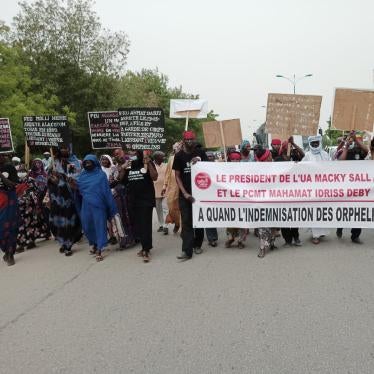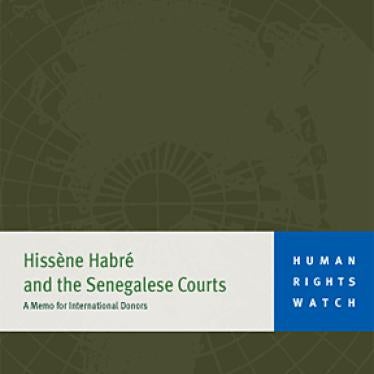(Banjul)- The African Union Assembly must call on Senegal to fulfill its international legal commitments and ensure that the exiled former president of Chad, Hissène Habré, is promptly tried for the crimes of which he is accused, the Campaign Against Impunity said today.
African Union (A.U.) leaders meeting in Banjul, The Gambia, on July 1 are expected to consider a confidential report by a panel of experts, whose names have never been disclosed, that was requested “to consider all aspects and implications of the Hissène Habré case as well the options available for his trial.”
The panel has met in secret, without any consultation with civil society or Hissène Habré’s victims. Members of the Campaign Against Impunity are holding news conferences today in 17 African countries to demand that Habré be tried.
“The African Union has to tell Senegal to prosecute Hissène Habré or extradite him to face justice before a court with full guarantee of impartiality and independence,” said Jacqueline Moudeina, president of the Chadian Association for the Promotion and Defense of Human Rights, a group that is part of the Campaign Against Impunity. “The African Union should choose justice, not impunity.”
Habré, who fled to Senegal in 1990 after an eight-year rule marked by serious and widespread human rights violations, was first indicted in 2000 in Senegal. After Senegalese courts ruled that he could not be tried there, and no African state stepped forward to do so, Habré’s victims pursued justice by turning to Belgium, which indicted him in September 2005.
In November 2005, after a Senegalese court refused to rule on his extradition, the Senegalese government asked the A.U. Assembly to decide the matter. The assembly appointed a committee of jurists to consider all aspects and implications of the case, as well as options for his trial to the 7th Ordinary Session of the Assembly in Banjul.
Also in November 2005, the Africa-Caribbean-Pacific/European Union (ACP/EU) organization stressed the need to bring Hissène Habré to justice. On November 18, 2005, the United Nations special rapporteur on torture called on the government of Senegal to extradite Hissène Habré expeditiously to Belgium.
The 1984 U.N. Convention against Torture and Other Cruel, Inhuman or Degrading Treatment or Punishment, which Senegal ratified in 1986, obliges states to investigate, and, if there is sufficient admissible evidence, to either prosecute or extradite alleged torturers who enter its territory. In May 2006, the United Nations Committee against Torture (CAT) condemned Senegal for failing to try Habré and requested that Senegal ensure Habré’s trial or extradition. (A copy of the ruling in French can be found here)
“Habré’s victims have been fighting for 16 years to see justice done,” said Kolawole Olaniyan, director of Amnesty International’s Africa Programme, also part of the Campaign Against Impunity. “It is time for Habré to face trial for his alleged crimes.”
“Bringing Habré to justice will be entirely consistent with the Constitutive Act of the African Union, which explicitly requires the organization to tackle the problem of impunity in Africa,” said Chidi Anselm Odinkalu, director of the Africa Programme at Open Society Justice Initiative.
“Habré’s trial would be a milestone in the fight to hold the perpetrators of crimes under international law, such as torture, criminally responsible for their crimes,” said Reed Brody, special counsel at Human Rights Watch, also part of the Campaign Against Impunity. “Whether Hissène Habré is to be tried in Belgium or elsewhere, African leaders must urge Senegal to act consistently with its obligations under international law and the ruling of the U.N. Committee against Torture – to either prosecute Hissène Habré or extradite him to a country where he can face a prompt and fair trial for the crimes he is accused of, without the imposition of the death penalty.”
Background
Hissène Habré ruled Chad from 1982 until 1990, when he was deposed by current President Idriss Déby Itno and fled to Senegal, which has given him a safe haven from criminal prosecution for 16 years now. His one-party government was marked by allegations of war crimes and crimes against humanity, including torture. Habré’s government periodically targeted various ethnic groups, killing and arresting group members en masse when he believed that their leaders posed a threat to his government. Files of Habré’s political police, the DDS (Direction de la Documentation et de la Sécurité) reveal the names of 1,208 persons who died in detention. A total of 12,321 victims of human rights violations were mentioned.
In February 2000, a Senegalese court charged Habré with torture and crimes against humanity and placed him under house arrest. But in March 2001, Senegal’s highest court said that Habré could not stand trial in Senegal for crimes allegedly committed elsewhere. Habré’s victims immediately announced that they would seek Habré’s extradition to Belgium, where 21 of Habré’s victims had filed suit. President Abdoulaye Wade of Senegal then stated that he would hold Habré in Senegal and that “if a country capable of organizing a fair trial – there is talk of Belgium – wants him, I do not foresee any obstacle.”
Last September, after a four-year investigation, a Belgian judge issued an international arrest warrant charging Habré with crimes against humanity, war crimes, and torture. Pursuant to the arrest warrant and a Belgian extradition request, Senegalese authorities arrested Habré on November 15. After a Senegalese court refused to rule on the extradition request, Senegal announced that it had asked the January summit of the African Union Assembly to recommend “the competent jurisdiction” for the trial of Habré. That summit set up a Committee of Eminent African Jurists to consider the options for Habré’s trial and to report back at the African Union summit in July in Banjul, The Gambia.
The Coalition Against Impunity is a coalition made up of over 300 African and international civil society groups formed to combat impunity in Africa.







